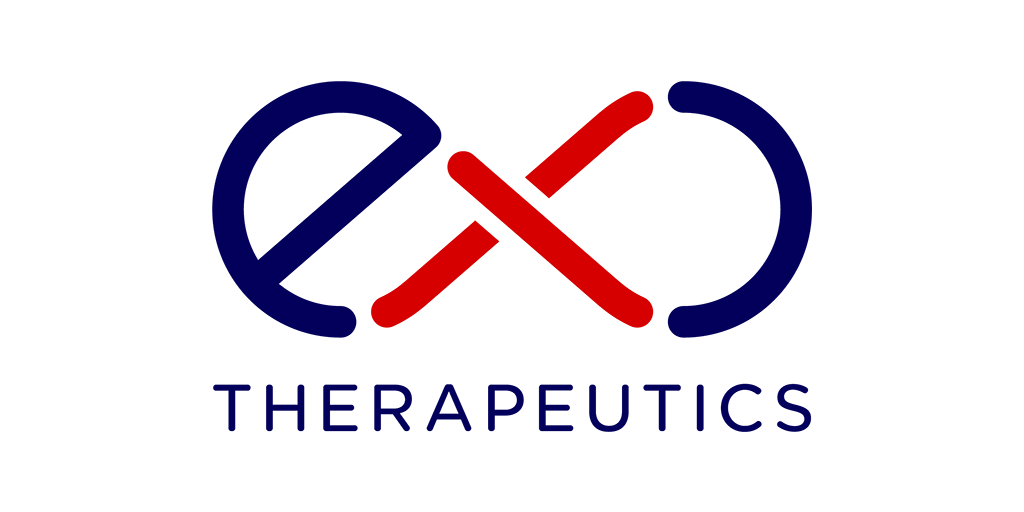– Efficacy of exosite-targeted TBK1/STING inhibitor validated across multiple preclinical models, supporting nomination of lead development candidate for treatment of autoimmune diseases –
CAMBRIDGE, Mass.--(BUSINESS WIRE)--Exo Therapeutics, Inc., a pre-clinical company developing a pipeline of drug candidates that target exosites, unique small-molecule binding pockets that are distinct from traditional active and allosteric sites, to reprogram target enzyme activity for precise and robust therapeutic effects, today presented a late-breaking poster on its preclinical program targeting the TBK1/STING interaction of the cGAS-STING pathway at the American College of Rheumatology’s Convergence Conference (ACR) in Washington, D.C.
Aberrant activation of the cGAS/TBK1-/STING pathway has been shown to be linked to autoimmune diseases like SLE, CLE, SSc and Sjögren’s. Historically, inhibiting this pathway has proven to be difficult for active-site inhibitors due to their inadequate selectivity, which can lead to off-target effects and narrow therapeutic indices. Exo’s approach seeks to overcome these challenges with its novel exosite inhibitors that disrupt STING-mediated TBK1 activation while avoiding the beneficial functions of the kinase on viral suppression and maintenance of autophagy.
Data presented show that EXO-TBKis, novel TBK1 inhibitors that selectively and potently inhibit the TBK1/STING pathway, demonstrated efficacy in multiple cellular and mouse models as well as patient-derived samples. These findings support the company’s nomination of a lead development candidate for the treatment of autoimmune diseases such as Systemic and Cutaneous Lupus (SLE and CLE), Systemic Sclerosis (scleroderma, SSc) and Sjögren’s Syndrome.
“Exo’s TBK1 selective exosite inhibitors have demonstrated their ability to potently and selectively inhibit pathogenic effects of TBK1/STING, while sparing beneficial antiviral and cellular functions,” said Dr. Jörg Distler, University of Erlangen. “This approach has the potential to deliver therapeutic benefit to individuals living with autoimmune diseases like SSc and I’m looking forward to the nomination of their lead development candidate based on these promising data.”
Data show that an EXO-TBK1i displayed exceptional exosite binding affinity on the target (IC50 -9nM), that translates into double-digit nanomolar potencies in human monocytes, THP1 cells, monocytes and mouse macrophages. EXO-TBK1i were also shown to demonstrate enhanced selectivity when compared to a TBK1 active-site, cGAS and STING inhibitors. Additionally, EXO-TBK1is were shown to preserve autophagy, while sparing RIG-I activity with 100-fold selectivity, two activities that are linked to effective immune responses to infection.
Dose dependent suppression of p-TBK1, p-STING and inflammatory cytokines were observed in a STING activated DMXAA mouse model. In a disease model, TREX-1 null mouse, EXO-TBK1i was shown to suppress heart inflammation with a dramatic reduction of proinflammatory cytokines including IFNβ, CXCL-10, CXCL-9 and IFIT1. The TBK1i also displayed dose-dependent inhibition of p-TBK1, p-STING, p-IRF3 and p-P65 in the TREX-1 model.
Most notably, EXO-TBK1i demonstrated robust effects in SLE and SSc patient samples. When assessed for activity in SLE patient-derived human whole blood and PBMC, EXO-TBK1i robustly suppressed pathway activation. Similarly, EXO-TBK1i significantly suppressed pathway activation and expression of SMA and stress fibers in SSc patient-derived fibroblasts.
Details of the poster presentations are as follows:
Abstract Title: Targeted Exosite Inhibition of STING Activation of TBK1 Selectively Blocks Type I Interferon and NFκB Responses for Treatment of Autoimmune Diseases
Presenting Author: Bhavatarini Vangamudi, Ph.D.
Presentation Type: Poster
Session: Late-Breaking Posters (L01 - L14)
Date: Monday, November 18
Presentation Time: 10:30 AM - 12:30 PM
Abstract ID: 1943848
Final Number: L01
About Exo Therapeutics
Exo Therapeutics is a small molecule drug discovery and development company co-founded by Professors David R. Liu, Alan Saghatelian and Juan Pablo Maianti with a pioneering technology to address intractable pharmaceutical targets. By leveraging the company’s ExoSightTM platform, Exo is developing a deep pipeline of potent drug candidates that bind exosites, distal and unique binding pockets that have the potential to reprogram enzyme activity for precise and robust therapeutic effect. Through this specific and selective approach to challenging targets, the company’s team of world-class researchers is unlocking breakthrough therapeutics in inflammation, oncology and a broad range of other diseases. For more information, visit www.exo-therapeutics.com.
Contacts
Company:
Lindsey Arnold
Lindsey.arnold@exo-therapeutics.com
Media:
Megan Prock McGrath
CTD Comms, LLC
megan@ctdcomms.com






